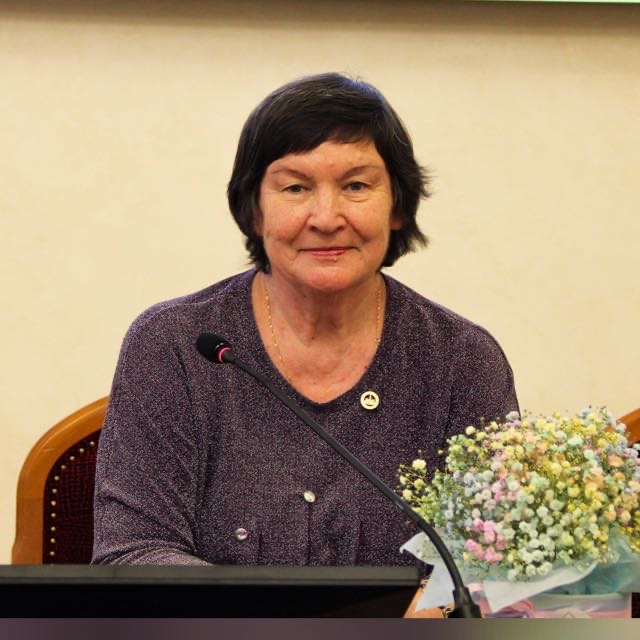Laboratory of highly organized structures
The Laboratory of Highly Organized Structures was created on the base of the group under the supervision of Dr. L.A. Kudryavtseva in 2000. Since 2008 the Laboratory is headed by Professor Lucia Ya. Zakharova.

Head of Laboratory
Full Professor, Dr. Lucia Zakharova
Phone number (843) 273-22-93
Room 306
Email lucia@iopc.ru, luciaz@mail.ru
Deputy Head of the Laboratory
Senior Researcher, PhD Gulnara Gaynanova
Room 310
Email: ggulnara@bk.ru; gaynanova@iopc.ru
Members and postgraduates
Senior Researcher, PhD Gulnara Gaynanova
Senior Researcher, PhD Elena Zhiltsova
Senior Researcher, PhD Ruslan Kashapov
Senior Researcher, PhD Elmira Vasilieva
Researcher, PhD Farida Valeeva

History of the laboratory's development
Laboratory of Highly Organized Structures (LHOS) is historically related to Laboratory of Organophosphorus Polymers (LOPP) under the leadership of Professor B.E. Ivanov, one of the largest and oldest laboratories of the A.E. Arbuzov Institute of Organic and Physical Chemistry (IOPC). Over 1975-1985 period, the laboratory staff comprised over 80 people and gathered leading scientific groups that carried out research on the tasks of the Presidium of the Academy of Sciences of the USSR. Eventually some of these research teams of LOPP branched out into independent laboratories headed by Professor V.S. Reznik, Professor Ya.A. Levin, Professor I.A. Nuretdinov. In 1996 the group of LHOS was separated and taken under the leadership of Dr. L.A. Kudryavtseva. At that time the main focus of the laboratory work was the study of influence of the solvents as well as micellar systems on the rate of nucleophilic substitution reactions of phosphorus acid esters. Dr. V.E. Belskiy and Dr. S.B. Fedorov played a central role in the evolution of laboratory and its creative development. Since 2008 the Laboratory is headed by Professor Lucia Ya. Zakharova.
Research trends
- The main research direction of the LHOS is the development of self-assembly strategies of the design of polyfunctional nanosystems with enhanced properties (catalysis, solubilization, anticorrosion and antimicrobial activity) based on the key “bottom-up” principle of supramolecular chemistry, i.e. non-covalent self-organization of surfactants, cyclophanes, and polymers. One of the priority research lines in the LHOS concerns specifically the formation of nanosized containers and polyelectrolyte capsules for organic and biological substrates in order to identify the factors controlling substrate reactivity, preservation, concentration and biotransport. A new approach to encapsulate hydrophobic (uncharged) substrates was developed using layer-by-layer technology allowing obtaining of micro- and nanocapsules with substrate binding and release properties. Recently the laboratory activity has been concerned with the solution of fundamental problems in medical chemistry, pharmacology, and nanoengineering. From this point of view, our research interest includes the investigation of the novel supramolecular systems that sensitive to external stimuli and capable to effectively interact with cell membranes.
- The achievement of the goals stated assumes a systematic study of self-assembly of individual amphiphilic compounds and their mixed systems, including their synthesis as a tool for progressive variation of the building block structure. This approach allows us to go from screening to the directed design of functional systems based on established regularities.
- Biomimetic nature of supramolecular systems allows us to solve the high-priority problems of the biotechnological applications: the formation of nanocontainers, micro- and nanocapsules for storage and delivery of therapeutic agents including water-insoluble drugs, DNA, diagnostic probes.
- Conventional direction of investigations in laboratory is fabrication of supramolecular catalytic systems using the strategy of amphiphilic compounds self-assembly for decontamination of toxic esters of phosphorus acids, acetylcholinesterase inhibitors. Collected results allows to design effective nanoreactors based on cationic surfactants, polymers, macrocycles and metal ions. It provides catalytic activity up to six and more orders of magnitude, specificity and producibility of process due to combined contribution of micellar and homogeneous catalysis, as well as immobilization of nanoreactors on polymer or inorganic template
- Laboratory pays much attention to the collaboration with research groups working in the key areas of regional science associated with oil extraction and processing. The experience gained and knowledge of the tendency in changes of properties of surfactants in condensed state makes it possible to design the inhibitors of corrosion - bactericides for the protection of oil field equipment and viscoelastic compositions for increasing oil recovery, etc.
Laboratory Equipment
Important results of laboratory
Selected Publications
Grants Support
Collaboration
- Kazan National Research Technological University
- Kazan (Volga region) Federal University
- Kazan Institute of Biochemistry and Biophysics of Kazan Scientific Center of the Russian Academy of Sciences
-
V. Zelman Institute for Medicine and Psychology, Novosibirsk State University
- L.M. Litvinenko Institute of Physical-Organic Chemistry and Coal Chemistry of National Academy of Sciences of Ukraine (Donetsk)
- University College London, School of Pharmacy (United Kingdom)
- University of Reading (United Kingdom)
- Institute of pharmacy Kazan State Medical University
- D. Mendeleev University of Chemical Technology of Russia
- Shemyakin-Ovchinnikov Institute of Bioorganic Chemistry
- Kazan National Research Technical University named after A. N. Tupolev - KAI
-
Lipoid GmbH
- Phospholipid Research Center, Heidelberg, Germany
- JSC «August» Inc.
- Skolkovo Institute of Science and Technology
- Karpichev Yevgen (h-èíäåêñ 16), Kapitanov Illia (h-èíäåêñ 8) - Department of Chemistry, Chair of Green Chemistry, Tallinn University of Technology, Academia tee 15, 12618 Tallinn, Estonia.
- Prof. Vitaliy V. Khutoryanskiy -School of Pharmacy, University of Reading, United Kingdom, h-èíäåêñ 39.
- Prof. Ijeoma F. Uchegbu, School of Pharmacy, University College London, United Kingdom, h-èíäåêñ 43.
